Ilya Massukh on digital transformation: task of the West — to destroy businesses in Russia
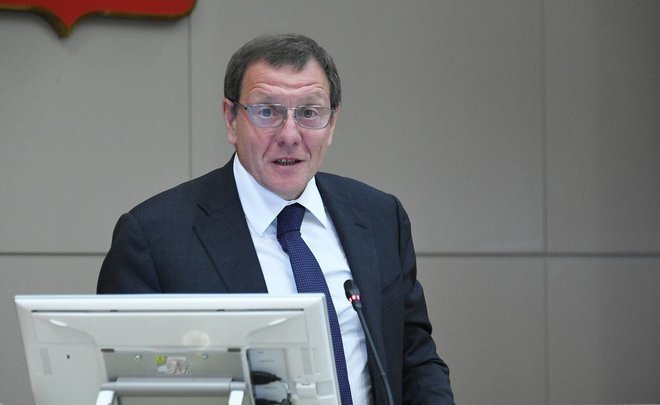
“Now the focus is on the use of Russian digital technologies, and Steve Jobs did not come up with anything supernatural, but assembled well-known components," Ilya Massukh, the head of the Competence Centre for Import Substitution in the Field of Information and Communication Technologies, told about the course for technological independence of Russia at a meeting of the board of directors of Tatneftekhiminvest Holding. The transition of industry to domestic technologies continues to be on the agenda. The Institute of Petrochemical Synthesis named after A.V. Topchiev offered their technology for TAIF-NK and TANECO, Moscow-based Vector — to localise the production of magnetostrictive sensors, and Nizhny Novgorod-based manufacturer Homa — to produce special adhesives for automakers. In a word, our enterprises have a lot to choose from.
The West wants to use digital dominance
Members of the Board of Directors of Tatneftekhiminvest-holding got acquainted with new import-substituting technologies on 22 August. This time, Russian scientists presented technologies for the production of alkylbenzines (alkylate) and polyurethane adhesives, and the main guest was the ex-head of the Russian Ministry of Finance, Ilya Massukh, now director of the Competence Centre for Import Substitution in the field of Information and Communication Technologies ANO.
Without an ornate introduction, he bluntly stated that the West would try to use its dominance in the digital sphere to destroy business in Russia. The course on technological independence will help to resist this.
“We have already faced the fact that non-market instruments are being used against Russia, and this is most clearly seen in digital field," he said, adding that the attacks on the digital infrastructure occurred quite quickly. “The task of the West is to destroy business in Russia by non-market methods. Then the companies find themselves at a disadvantage and cease to exist.”
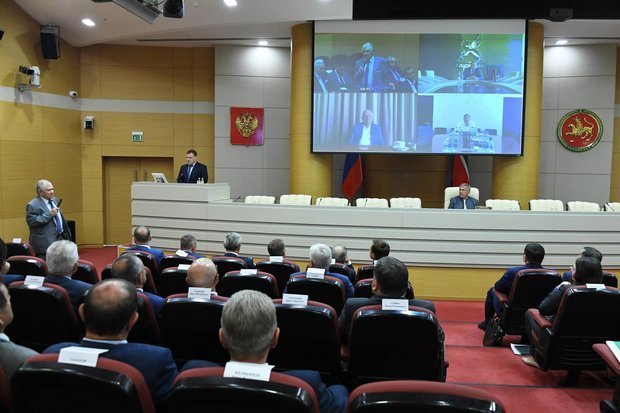
224 billion rubles — for domestic technologies
The course towards technological independence of Russia is laid down in the strategy of digital transformation of state-owned companies (Gazprom, Rosneft, Gazpromneft), and the focus in it is on the use of domestic technologies, Ilya Massukh said. “Steve Jobs did not invent anything supernatural, but assembled well-known components," he assured the audience that Russian developments are quite promising and are not inferior to Western ones. He also explained the need to switch to the domestic digital technologies with pragmatic goals — it's safer this way.
“There is a question of near-physical safety — protection from drones. There is more digitalisation here than in avionics," he explained why it is possible to shoot down drones.
Anyway, the process of digital transformation has long been going, it includes the companies from the list No. 91 P. These are all the largest Russian companies with their subsidiaries. But if earlier they were focused on Western markets, now they are focused on domestic consumers. According to the speaker, the volume of their investments in digital technologies amounted to 224 billion rubles. “This is a decent figure. Before that, there were less than 150 billion, and all of them went to Western markets. Now they are reoriented to Russia," Massukh said. This led to a twofold increase in demand for Russian software. The economic effect by the end of 2022 is not very great yet, but it is going to increase in the future, the head of the Competence Center for Import Substitution in the field of information and Communication Technologies assured.
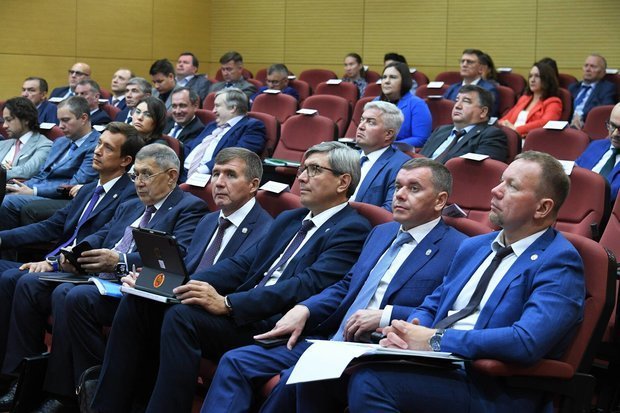
On trial by TAIF-NK and TANEKO
For Tatarstan oil refiners, TAIF-NK and TANECO have proposed a new technology for the production of high-octane gasoline of the Euro 5 class. Deputy Director of the A.V. Topichev Institute of Petrochemical Synthesis Konstantin Dementyev spoke about the successful experience of replacing a highly toxic component — liquid acid — with a solid heterogeneous catalyst, resulting in alkylbenzine (alkylate). Its use increases the octane number of automobile gasoline to 98. According to Konstantin Dementyev, there is great interest in the production technology of alkylbenzine in the world, as it can become the basis of eco-friendly fuel. Currently, there are seven units in Russia with a capacity of 2 million tonnes a year. The entire production is based on classical technologies using liquid acids. But their use has drawbacks. First of all, it is necessary to dispose of acids at the end of production. It is necessary to switch from the use of liquid acids to more environmentally friendly solid catalysts.
Such technology was developed at the A.V.Topchiev Institute of Petrochemical Synthesis, RAS. It was scaled from a laboratory unit to an alkylation test bench with a reactor volume of 200 litres. It operates on the basis of ElINP JSC (Elektrogorsky Institute of Oil Refining) in Elektrogorsk, the design capacity is up to 1 tonne of gasoline a day. By this technology, it is possible to produce up to 250 thousand tonnes of alkylbenzines at TANECO and TAIF-NK, the developer suggested.
Rustam Minnikhanov asked the chief expert how much it could be in demand. “This topic is interesting both for TAIF-NK and Tatneft, this product can be useful," said the director general of Tatneftekhiminvest-holding, Rafinat Yarullin.
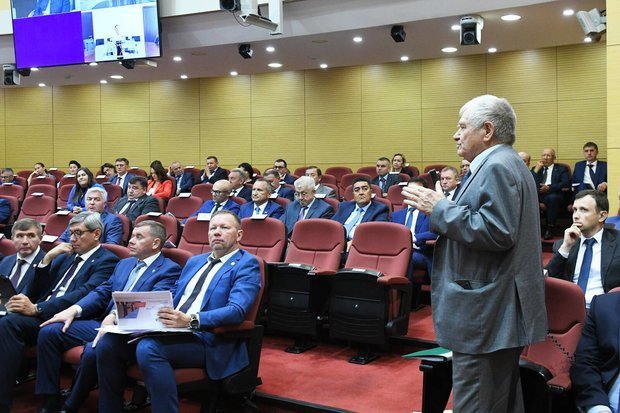
Albert Shigabutdinov, the chairman of the management board of TAIF JSC, joined the discussion via video link.
“This technology complies with the quality standard K5 and higher. With this technology, we expect to scale up, improve gasoline production. I think that within a year we will work together and come to a final decision," he said.
Tatneft is also looking closely at it. “We have been looking at this unit and are still ready to cooperate within the framework of pilot industrial works," said Nail Maganov, the director general of Tatneft PJSC.
While imported devices are working, but it's time to start testing our own
The Moscow company Vector has taken the initiative to localise the production of magnetostrictive sensors, although their devices are not yet used at the enterprises of the republic. “So far the devices are not installed in the republic, they have only been put into pilot operation. We talked at exhibitions, but there was a lot of competition, we could not break through," the company's financial director, Alexey Fomichev, explained the essence of the initiative. According to him, the price of the devices is adequate, lower than foreign analogues. A pilot batch would help to establish supplies, he suggested.
“While imported devices are working, but we need to start working with the KNRTU," Rafinat Yarullin prudently remarked.
“First we need to make sure that the price and quality are suitable, the topic is important and necessary, it is impossible without it," Rustam Minnikhanov agreed with him.
The head of the Ministry of Finance of the Republic of Tatarstan, Ayrat Khayrullin, was instructed to study the use of the possibilities of wireless data transmission of Vector company.
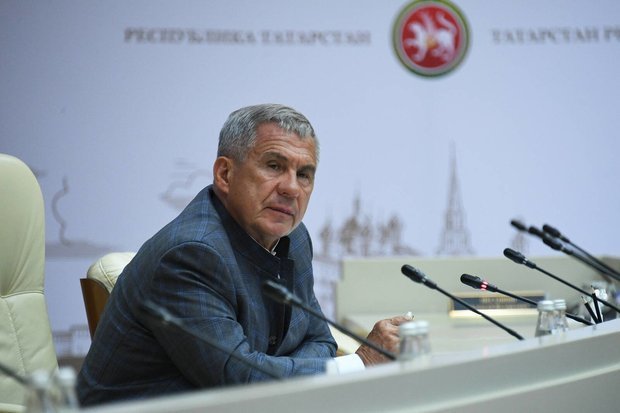
“It is the first time we got in line for adhesives”
Then we found a possible Russian supplier of industrial adhesives for residents of Alabuga and the automakers KAMAZ and Sollers. Konstantin Shirshin, the deputy director general of Homa, made a presentation application for a possible partnership. The company is a supplier of household adhesives for the networks Leroy Merlin, Petrovich, but is engaged in its own developments. The annual turnover is 10 billion rubles.
“Now there are times when there are queues of consumers. I don't remember such in the industry," Shirshin said.
The problem, according to him, rests not on money, but on equipment, without which it is impossible to start production. The company expands the range of adhesives for furniture of class D4, works with SIBUR, and cooperates with the KFU in the field of chemistry. Special emphasis is placed on the production of adhesives for insulated vans. The expert opinion sounded like “It is necessary!” “There are no adhesives in the republic, adhesives are needed for Alabuga, KAMAZ, and Sollers," concluded Rafinat Yarullin.